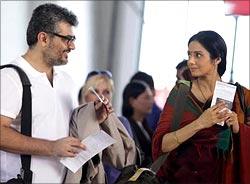 Raja Sen thinks Sridevi excels in her comeback film.
Raja Sen thinks Sridevi excels in her comeback film. In India, our post-Colonial hangover includes a peculiar English-language elitism, where those even halfway in control of the language thumb their nose at those unable to speak it.
Where folk routinely, and with unforgivable curtness, cut folk off mid-sentence to snappily correct pronunciation. Which is why a scene in Gauri Shinde's new film -- where a simple Maharashtrian woman is castigated by her family for calling jazz "jhaaz" (even as they proudly call it "jhazz" themselves) -- rings so true.
They don't intentionally mean to humiliate the woman with their constant use of English, but appear befuddled by her lack of what they imagine to be the most basic of linguistic skills.
Shashi, the devastatingly unassuming heroine of English Vinglish, is a homemaker and crafter of much-adored laddoos, a fledgling entrepreneur doing what she does because its the only thing she's applauded for. Not knowing English, however, cripples her at nearly every turn, till the fact that she can't speak the language becomes her not-so-secret shame, not unlike Kate Winslet's illiteracy in The Reader. And here's the thing: Sridevi does far better.
It helps, of course, that the script services her at every turn. Shinde, making her directorial debut, concentrates not on the overarching drama or the narrative arc, but instead labours hard on creating a heroine so flawless, so grounded, so perfectly lovely that we can't help but be swayed by her. She is a heroine so exaggeratedly Good that she, contrasted against her cartoonishly callous family, appears a superwoman.
This could very well have been another case of script servicing star except, as said, the star really did deserve a script this slavish.
Sridevi's been away nearly fifteen years, and Hindi cinema has changed significantly, a fact perhaps most amusingly encapsulated by the way the actress gasps in this film on seeing a couple kiss in a coffee shop, something unimaginable (on-screen, anyway) in her time.
Yet here she is, better than ever. Yes, ever. English Vinglish sees the veteran heroine trade in glamour for primness and chiffon for cotton, and reining in her wondrously exaggerated acting instincts: even her inimitably shaky-shrill voice works here as a facet of her character's fragility, her constant insecurity.
Sri excels in fleshing out her character -- a character too simple to be, say, charismatic -- and also, more importantly, in winning the audience over so completely that her little triumphs, like navigating a turnstile at a subway station, seem like major highs. We root for her at every step, and that is no small
feat.
And while all of Shashi's triumphs may, in fact, be minor ones, the very fact that we gladly cheer on a woman's struggle to learn how to order coffee correctly in the same way that we'd egg on, say, a loveable hockey team on its last legs, is testimony to how well the Shinde-Sridevi tag team builds the character.
The film is staggeringly basic, with a fiendishly unclever plot -- woman feels bad, learns English, feels great -- and a narrative completely bereft of surprise. However, in a film cluttered with lesser victories, Shinde's greatest one might be the deftness with which she steers clear of melodrama.
The result is simple, effective and undeniably striking: rather like the sarees Shashi constantly wears (and even, inexplicably, sleeps in.)
It is this deft assuredness which characterises English Vinglish throughout, with Shashi's obnoxious husband (played by the terrific Adil Hussain in a vintage Kay Kay Menon kinda way) casually but firmly distancing himself from her by throwing somewhat accented English phrases into their conversation, and then retiring to bed with a John Grisham paperback.
Shashi can still manage begrudgingly to get by in Pune, but when a wedding takes her to New York City, she's hopelessly out of her depth. And yet, as evidenced by a smashing superstar cameo on her flight, there's much to be found in the kindness of strangers.
New York, naturally, overwhelms. There are English mishaps, leading to a Mind Your Language-like classroom, complete with a French chef who has the eyes for, well, Sha-she's eyes. And it is here Shinde shows us how, while every global citizen in the classroom is tut-tutted for incorrect pronoun usage, that European gets away with "she is a very beautiful" and "my English not clean", while a South Indian techie seems to have enrolled for much lesser language quibbles.
The sad truth is that we Indians refuse to recognise the exotic in our accidents, the beauty in sloppy, dialectic pronunciation differences, the joy of an over-hardened R or a too-soft T, and prefer instead the rulebook. We're losing out on such lovely, lovely slipups, all because of this need to colour within the lines.
But I digress. Go watch English Vinglish, and take your mothers along. As shown by one great scene which has Shashi speaking furiously in Hindi to her chef friend Laurent, who replies back in thoughtful-sounding French, it isn't about language.
It's about one of the biggest stars of her era transformed into the plainest Jane, a delightful heroine who saves all her grace for hoisting her son onto her pillow. It's about how vital the smallest-seeming dreams can prove to be. Ah, spell it English Win-glish, I say.
Rediff Rating:










